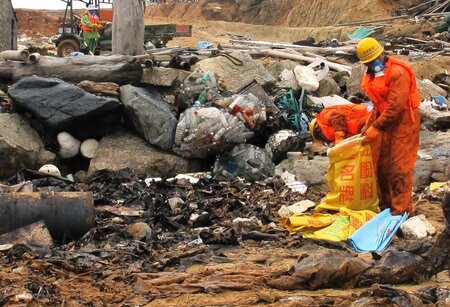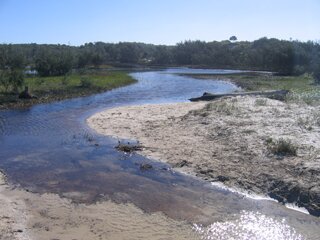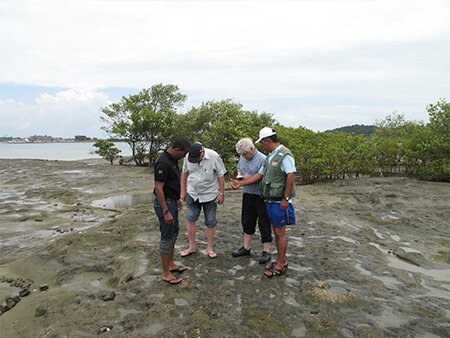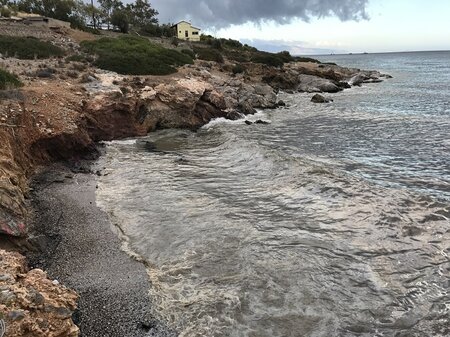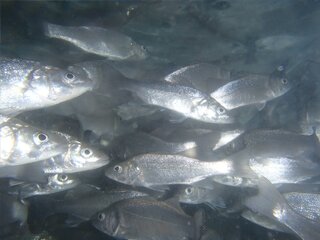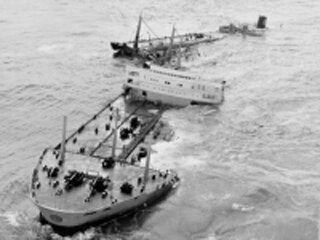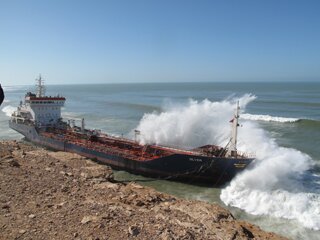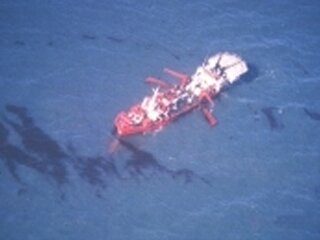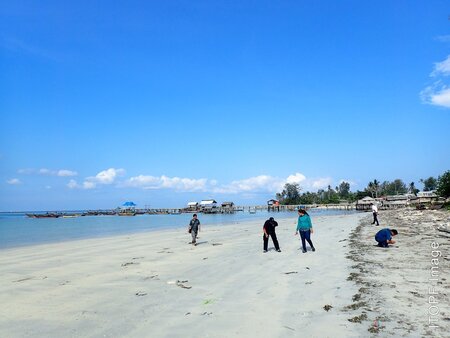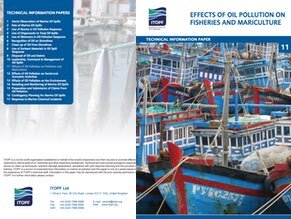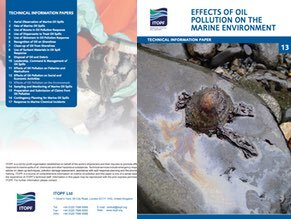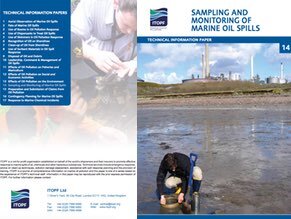Effects in Offshore and Coastal waters
Most oils float on the sea surface where they are spread over a wide area by currents, wind and waves.
Depending on the type of oil, it may disperse into the top few metres of the water column. As a result the potential environmental impacts of oil in open waters are generally confined to this upper area of the water column although, on occasion, some types of oil will sink and environmental impacts may be observed on the seabed. The types of organisms that are commonly impacted in an open sea spill include; plankton, fish, seabirds and marine mammals and reptiles.
Plankton
The upper pelagic zone of seas and oceans support a myriad of planktonic organisms, including bacteria, eggs and larvae, and a variety of animal and plant species. It is well established that plankton is sensitive to oil exposure and consequently short-term impacts should be expected in the immediate vicinity of the oil. However, organisms with planktonic life stages are characteristically present in the plankton in huge numbers and will naturally suffer very high levels of mortality. As a result, a large proportion of a given species will remain unaffected by the spill and it is rare for plankton mortalities following a spill to result in reduced adult populations.
Fish

Although the eggs and larvae of fish may be susceptible to the effects of oil, adult fish tend to be more resilient. Reductions in wild fish stocks in offshore and coastal waters following oil spills have rarely been detected, as it is thought that fish can detect unfavourable water conditions and actively swim away to avoid them. Where mass mortalities have occurred, they have been caused by very high, localised concentrations of dispersed oil in shallow or confined waters. Fish mortalities can occur with cultured fish stocks where individuals are unable to actively avoid the oil.
Seabirds

In open water, seabirds are some of the most vulnerable of all animals, and in some incidents large numbers may perish. Fouling of plumage (which is essential for thermoregulation and buoyancy control) is the most visible effect. Although cleaning and rehabilitation of birds may be attempted, success is often linked to the species of bird, and in many cases only a small fraction of those treated will survive. However, it is encouraging that with experience and research, best practices for bird cleaning are emerging and outcomes are improving. Increasingly, oil contingency plans define policies on how to deal with oiled seabirds and wildlife.
Sea Mammals and Reptiles
Due to the tendency of oil to float at the sea surface, marine mammals and reptiles are at risk as they must surface to breathe. The oil can potentially cause harm to nasal tissues and eyes and whilst mortalities caused by oil have been recorded, the majority of mortalities which coincide with oil spills have usually been found to result from other causes. Mammals that rely on fur to regulate body temperature can be vulnerable to the effects of oil as they may be harmed or die from hypothermia or overheating if their fur becomes matted with oil. For marine reptiles, the greatest impact is probably away from the open sea and on their nesting beaches should they become contaminated with oil.
A case for incorporating Environmental Social & Governance (ESG) into spill response
Over recent years the shipping industry has begun to discuss issues relating to sustainability, often within the framework of Environmental, Social and Governance (ESG). In the context of ship-source pollution response, there is debate over how ESG can be practically incorporated into this emergency response sector, and concerns that it’s inclusion may lead to increased bureaucracy and higher workloads at moments when time is already at a premium. This paper therefore examines the feasibility and usefulness of monitoring sustainability during maritime pollution response, and provides practical recommendations on how ESG considerations can be tailored to the spill response sector.
Categories: Environmental effects, Economic effects, Planning & operations, Papers
Approaches to environmental damage claims (2009)
This paper examines the differences between the approaches to environmental damage compensation under the US 1990 Oil Spill Pollution Act and the international regime.
Categories: Environmental effects, Compensation, Damage Assessment, Papers
Are post-spill environmental studies becoming the norm? (2015)
This paper uses information from ITOPF attended incidents to look at trends in conducting post-spill studies, and offer a number of possible reasons for these trends; including a general heightened awareness of environmental issues leading to a shift in attitudes and expectations as well as legislative changes. The paper will also look at the implications of these trends for those involved with such studies and re-examine the ideal drivers for scientifically robust post-spill studies.
Categories: Environmental effects, Papers
Does cleaning oiled seabirds have conservation value? Insights from the South African experience with African Penguins (2007)
Although there is general consensus among investigators that large numbers of seabirds are killed as a result of oil spills, there is disagreement, mostly in the northern hemisphere, about the extent to which oil mortality is biologically significant to local, regional and global populations.
Categories: Response Techniques, Environmental effects, Papers
Environmental damage: Changing perceptions and future outlook (2018)
Over the last fifty years, increased global awareness of environmental issues has led to growing recognition of environmental stewardship as an essential component of economic development.
Categories: Environmental effects, Papers
Fishing and harvesting bans in oil spill response (1999)
Fishing and aquaculture harvesting bans are increasingly used as an oil spill management tool, with the intention of protecting public health and consumer markets. Such bans are easily imposed, but a rational basis is needed for maintaining and lifting them. Scientific criteria offer the best prospect for administering fishery bans in a consistent way, but recent marine pollution incidents reveal contradictions in their application.
Categories: Environmental effects, Papers
From the Torrey Canyon to today: A 50 year retrospective of recovery from the oil spill and interaction with climate-driven fluctuations on Cornish rocky shores (2017)
This paper highlights lessons learnt from observations stretching back 60 years, both before and after the Torrey Canyon spill, for rocky shore monitoring, especially the need for broad-scale and long-term monitoring to separate out local impacts (such as oil spills) from global climate-driven change.
Categories: Environmental effects, Papers
Ships and the marine environment (2001)
Ships interact with the environment in which they operate in many ways. Shipping casualties provide the most visual manifestation of the interaction between ships and the marine environment, especially if they result in the death of crew or passengers, or in the release of hazardous cargo or fuel.
Categories: Environmental effects, Papers
The adaptation of mariculture practices in response to spilled oil (1999)
Oil spills may contaminate both mariculture facilities and livestock. Prevention of oiling should therefore be afforded a high priority. A number of traditional spill response measures but also self-help response options are open to mariculturalists, that may avoid or limit the effects of spilled oil. The advantages and drawbacks of each of these approaches in the context of oil spill response are discussed.
Categories: Response Techniques, Environmental effects, Papers
The Sea Empress oil spill: Environmental impact and recovery (1999)
72.000 tonnes of light crude oil were released from the Sea Empress at the entrance to Milford Haven, South Wales over a 7 day period in February 1996, in an area of exceptional environmental value for wildlife, tourism and natural beauty. Natural factors coupled with effective clean-up at sea and on shore, minimised environmental impact.
Categories: Environmental effects, Spill Response, Papers
The use and misuse of SCAT in spill response (2017)
In this paper we review the use and misuse of SCAT in several recent smallscale incidents and discuss the implications for the wider implementation of SCAT moving forward.
Categories: Environmental effects, Papers
TIP 11: Effects of oil pollution on fisheries and mariculture
This paper describes the effects of ship-source oil pollution on fishing and mariculture and provides guidance on response measures and management strategies which may help to reduce the severity of oil spill impacts. Damage to other economic resources is considered in a separate Technical Information Paper.
Categories: Environmental effects, Economic effects, Technical Information Paper (TIPS)
TIP 13: Effects of oil pollution on the marine environment
This paper describes the effects of ship-source oil spills and resultant clean-up activities on marine flora and fauna, and their habitats. Particular attention is devoted to discussing the complex interactions between oil and biological systems, which have been the subject of diverse studies over many years. Separate ITOPF papers consider the specific effects of oil on fisheries and mariculture and on wider human activity.
Categories: Environmental effects, Technical Information Paper (TIPS)
TIP 14: Sampling and monitoring of marine oil spills
This paper provides a broad overview of the monitoring and sampling procedures that can be used for qualitative and quantitative monitoring of oil contamination. While qualitative analyses can confirm the source of oil contamination, monitoring programmes are often concerned with the quantitative changes in hydrocarbon levels over time. Guidance on analytical best practice is given and common terminology is explained. However, the techniques and observations required to monitor specific ecological or biological effects and to monitor contaminants in the air are beyond the scope of this paper.
Categories: Environmental effects, Planning & operations, Technical Information Paper (TIPS)

